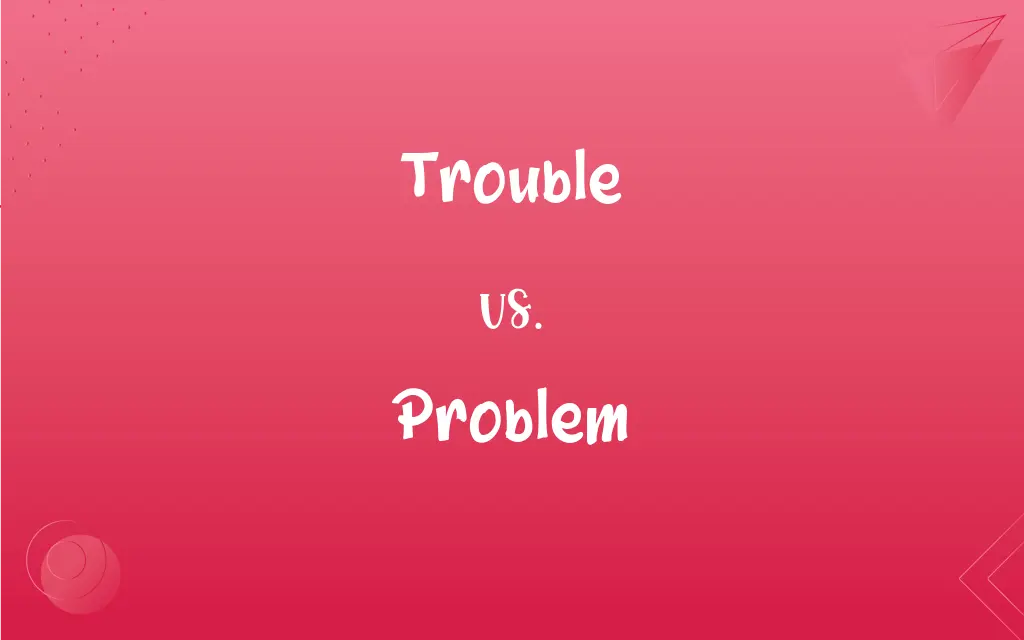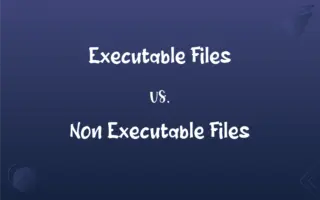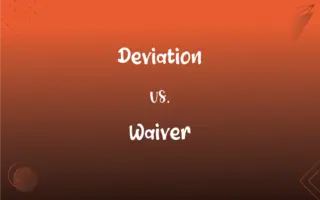Trouble vs. Problem: What's the Difference?
Edited by Harlon Moss || By Janet White || Updated on October 19, 2023
"Trouble" implies difficulties or distress, while "problem" refers to a specific question or situation requiring a solution.

Key Differences
"Trouble" often conveys a sense of distress, hardship, or concern, it's a broad term that can refer to almost any kind of difficulty, large or small. On the other hand, "problem" typically refers to a more definite obstacle or issue, often one that demands a solution or answer. While both "trouble" and "problem" suggest complications, "trouble" can have a more emotional connotation, and "problem" is often used in more formal or systematic contexts.
In everyday language, "trouble" might refer to a range of situations, from minor inconveniences to significant worries. However, a "problem" is usually an obstacle that can be defined, understood, and addressed, often with a specific solution. Both "trouble" and "problem" indicate something negative, but "trouble" can be more ambiguous, while "problem" implies the possibility of resolution.
When someone is in "trouble," it can mean they're in a situation of distress, danger, or under threat of negative consequences, like a child breaking a rule at school. Conversely, having a "problem" suggests there's a specific issue at hand, like a math question on a test or a logistical challenge in a project. Both "trouble" and "problem" carry negative connotations, but "trouble" often implies being in a state of discomfort or risk, whereas "problem" implies a challenge to be met or question to be answered.
"Trouble" can also be a verb, as in "don't trouble yourself," meaning don't go to any effort or cause yourself distress. "Problem," however, is strictly a noun; it's the thing itself, not the action. Both "trouble" and "problem" suggest complication or difficulty, but "trouble" is more versatile in its usage, while "problem" is more concrete and specific.
In a more abstract sense, "trouble" might refer to concepts or societal issues, like "the trouble with the modern world." A "problem," by contrast, would likely be used to discuss a specific, solvable issue within that broader context, like pollution or traffic congestion. Both "trouble" and "problem" denote negative situations, but "trouble" can be more existential or thematic, while "problem" is more likely to refer to a distinct, addressable matter.
ADVERTISEMENT
Comparison Chart
Part of Speech
Noun and Verb
Noun
Connotation
Emotional, can be vague
Specific, calls for a solution
Usage
Broad situations, distress
Defined issues, requires answers
Flexibility
More versatile in usage
More formal and systematic
Resolution
Not always solvable
Implies a need for solution
ADVERTISEMENT
Trouble and Problem Definitions
Trouble
Difficulty or problems.
He's been in a lot of trouble since he lost his job.
Problem
An inquiry starting from given conditions to investigate or demonstrate a fact, result, or law.
She solved the math problem easily.
Trouble
Effort or exertion.
She went to a lot of trouble to make the dinner.
Problem
A source of perplexity, distress, or vexation.
His attitude is becoming a problem.
Trouble
A cause of distress, disturbance, or pain.
The trouble with my back has gotten worse.
Problem
Difficulty in understanding or accepting.
I have a problem with your theory.
Trouble
The state of being distressed or worried.
She looked like she was in trouble.
Problem
A thing that is difficult to achieve or accomplish.
The major problem is funding the project.
Trouble
To cause inconvenience or difficulty to.
I hope I'm not troubling you with my request.
Problem
A question to be considered, solved, or answered
Math problems.
Trouble
A state of distress, affliction, difficulty, or need
Tried to console them in their trouble.
Got in trouble with the police.
Problem
A situation, matter, or person that is hard to deal with or understand
Was having problems breathing.
Considered the main problem to be his boss. See Usage Note at dilemma.
Trouble
A distressing or difficult circumstance or situation
I've had troubles ever since I took this job.
Problem
A personal matter that causes one difficulty or needs to be dealt with
Felt her tyrannical boss had deep-seated problems.
Trouble
A cause or source of distress, disturbance, or difficulty
The new recruits were a trouble to him.
Problem
A misgiving, objection, or complaint
I have a problem with his cynicism.
Trouble
Effort, especially when inconvenient or bothersome
Went to a lot of trouble to find this book.
Problem
Difficult to deal with or control
A problem child.
Trouble
A condition of pain, disease, or malfunction
Heart trouble.
Car trouble.
Problem
Dealing with a moral or social problem
A problem play.
Trouble
Public unrest or disorder.
Problem
A difficulty that has to be resolved or dealt with.
She's leaving because she faced numerous problems to do with racism.
Trouble
An instance of this; a disturbance.
Problem
A question to be answered, schoolwork exercise.
Study hard, but don't overdo it. The problems in the exam won't be difficult to solve.
Trouble
Troubles Any of various conflicts or rebellions in Ireland or Northern Ireland, especially the period of social unrest in Northern Ireland beginning in 1969.
Problem
A puzzling circumstance.
Trouble
To afflict with pain or discomfort
My stomach is troubling me.
Problem
Objection.
You got a problem with that?
Trouble
To cause to be anxious or worried
Was troubled by the decline in sales.
Problem
Difficulty in accepting or understanding or refusal to accept or understand.
You made your best honest effort; if they judge you harshly, that’s their problem, not yours.
Trouble
To cause to have emotional or mental problems that interfere with social functioning
A teenager who is troubled and needs help.
Problem
(climbing) A set of moves required to complete a climb.
Trouble
To inconvenience; bother
May I trouble you for directions?.
Problem
(of a person or an animal) Difficult to train or guide; unruly.
Trouble
To agitate; stir up
Winds troubling the waters.
Problem
Causing a problem; problematic; troublesome.
Trouble
To take pains
They trouble over every detail.
Problem
A question proposed for solution; a matter stated for examination or proof; hence, a matter difficult of solution or settlement; a doubtful case; a question involving doubt.
Trouble
A distressing or dangerous situation.
He was in trouble when the rain started.
Problem
Anything which is required to be done; as, in geometry, to bisect a line, to draw a perpendicular; or, in algebra, to find an unknown quantity.
Trouble
A difficulty, problem, condition, or action contributing to such a situation.
The trouble was a leaking brake line.
The trouble with that suggestion is that we lack the funds to put it in motion.
The bridge column magnified the trouble with a slight tilt in the wrong direction.
The trouble with that suggestion is that we lack the funds to put it in motion.
The bridge column magnified the trouble with a slight tilt in the wrong direction.
Problem
A state of difficulty that needs to be resolved;
She and her husband are having problems
It is always a job to contact him
Urban problems such as traffic congestion and smog
Trouble
A violent occurrence or event.
The troubles in Northern Ireland
Problem
A source of difficulty;
One trouble after another delayed the job
What's the problem?
Trouble
Efforts taken or expended, typically beyond the normal required.
It's no trouble for me to edit it.
Problem
A question raised for consideration or solution;
Our homework consisted of ten problems to solve
Trouble
A malfunction.
He's been in hospital with some heart trouble.
My old car has engine trouble.
Problem
A matter or situation regarded as unwelcome or harmful and needing to be dealt with and overcome.
We've encountered a problem with the software.
Trouble
Liability to punishment; conflict with authority.
He had some trouble with the law.
Trouble
(mining) A fault or interruption in a stratum.
Trouble
(Cockney rhyming slang) Wife. trouble and strife
Trouble
To disturb, stir up, agitate (a medium, especially water).
Trouble
(transitive) To mentally distress; to cause (someone) to be anxious or perplexed.
What she said about narcissism is troubling me.
Trouble
(transitive) In weaker sense: to bother or inconvenience.
I will not trouble you to deliver the letter.
Trouble
To take pains to do something.
I won't trouble to post the letter today; I can do it tomorrow.
Trouble
(intransitive) To worry; to be anxious.
Trouble
To put into confused motion; to disturb; to agitate.
An angel went down at a certain season into the pool, and troubled the water.
God looking forth will trouble all his host.
Trouble
To disturb; to perplex; to afflict; to distress; to grieve; to fret; to annoy; to vex.
Now is my soul troubled.
Take the boy to you; he so troubles me'T is past enduring.
Never trouble yourself about those faults which age will cure.
Trouble
To give occasion for labor to; - used in polite phraseology; as, I will not trouble you to deliver the letter.
Trouble
Troubled; dark; gloomy.
Trouble
The state of being troubled; disturbance; agitation; uneasiness; vexation; calamity.
Lest the fiend . . . some new trouble raise.
Foul whisperings are abroad; unnatural deedsDo breed unnatural troubles.
Trouble
That which gives disturbance, annoyance, or vexation; that which afflicts.
Trouble
A fault or interruption in a stratum.
She never took the trouble to close them.
Trouble
A source of difficulty;
One trouble after another delayed the job
What's the problem?
Trouble
An angry disturbance;
He didn't want to make a fuss
They had labor trouble
A spot of bother
Trouble
An event causing distress or pain;
What is the trouble?
Heart trouble
Trouble
An effort that is inconvenient;
I went to a lot of trouble
He won without any trouble
Had difficulty walking
Finished the test only with great difficulty
Trouble
A strong feeling of anxiety;
His worry over the prospect of being fired
It is not work but worry that kills
He wanted to die and end his troubles
Trouble
An unwanted pregnancy;
He got several girls in trouble
Trouble
Move deeply;
This book upset me
A troubling thought
Trouble
To cause inconvenience or discomfort to;
Sorry to trouble you, but...
Trouble
Disturb in mind or make uneasy or cause to be worried or alarmed;
She was rather perturbed by the news that her father was seriously ill
Trouble
Take the trouble to do something; concern oneself;
He did not trouble to call his mother on her birthday
Don't bother, please
Trouble
Cause bodily suffering to
FAQs
Is a "problem" always solvable?
Not always, but a "problem" typically implies an issue that requires or invites a solution.
Does "trouble" always imply a serious situation?
No, "trouble" can refer to minor difficulties or major distress.
Can "trouble" be used in a positive context?
Typically, no. "Trouble" usually has negative connotations, indicating distress or difficulty.
Can "trouble" be used to describe health issues?
Yes, people often use "trouble" to describe health difficulties, like "stomach trouble."
Can "problem" be used in a scientific context?
Yes, "problem" is often used to describe a hypothesis or question to be solved through scientific methods.
Can "trouble" also be used as a verb?
Yes, "trouble" can be used as both a noun and a verb.
Can a "problem" be an abstract concept?
Yes, "problems" can be tangible issues or abstract difficulties needing resolution.
Are "problems" quantifiable?
Often, yes. "Problems" often have definable parameters and can be measured or quantified in some way.
Is "trouble" a more informal term?
Yes, "trouble" is often used in more informal, everyday language.
Can animals have "problems"?
Yes, animals can face challenges or difficulties described as "problems."
Is "trouble" subjective?
Yes, what constitutes "trouble" can vary greatly depending on individual perspectives.
Is there a plural form of "problem"?
Yes, the plural form is "problems."
Is a "problem" always negative?
Typically, yes, as it represents a difficulty or challenge, though solving a problem can have positive outcomes.
Can problems be "created"?
Yes, actions or circumstances can create problems that didn't exist before.
Can you "get in" a problem?
No, the correct usage is "have a problem" or "encounter a problem."
Can "trouble" be used metaphorically?
Yes, "trouble" is often used metaphorically to describe broader societal or existential issues.
Can you "cause" trouble?
Yes, "causing trouble" means creating difficulties or disturbances for others.
Can a "problem" exist without a known solution?
Yes, some problems are complex and may not have an immediate or known solution.
Does "trouble" imply fault or blame?
Not necessarily, but it can imply that something has gone wrong or is amiss.
Is "in trouble" the same as "having trouble"?
No, "in trouble" typically means being in a situation with negative consequences, while "having trouble" refers to experiencing difficulty with something.
About Author
Written by
Janet WhiteJanet White has been an esteemed writer and blogger for Difference Wiki. Holding a Master's degree in Science and Medical Journalism from the prestigious Boston University, she has consistently demonstrated her expertise and passion for her field. When she's not immersed in her work, Janet relishes her time exercising, delving into a good book, and cherishing moments with friends and family.
Edited by
Harlon MossHarlon is a seasoned quality moderator and accomplished content writer for Difference Wiki. An alumnus of the prestigious University of California, he earned his degree in Computer Science. Leveraging his academic background, Harlon brings a meticulous and informed perspective to his work, ensuring content accuracy and excellence.































































